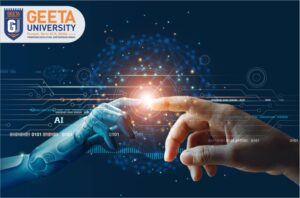Why AI is Important in the Modern World: A Transformative Force
UncategorizedWhy AI is Important in the Modern World: A Transformative Force
- July 1, 2024
- Geeta University
Heading
Artificial intelligence (AI) has become an undeniable force in the modern world, permeating nearly every aspect of our lives. From the moment we wake up to the algorithms recommending our news feed, AI is silently shaping our experiences. But why exactly is AI so important? Here’s a comprehensive exploration of its significance in today’s landscape.

Admission Open 2024-2025
For Your bright Future
Heading
If you are a good listener and can provide solutions for people’s problems, a life coach is the perfect business idea for you. You can do this face to face, through a podcast, on YouTube or other video streaming platforms, etc.
We have shortlisted trendy business ideas for fresh MBA graduates. These ideas suit the respective best MBA courses. Most of these ideas do not require huge investment and ensure quicker ROI on the business. Start today your journey of entrepreneurship with one of these business ideas.
1. Automating Tasks and Boosting Efficiency:
One of the most fundamental impacts of AI is its ability to automate repetitive and time-consuming tasks. This frees up human workers to focus on more complex and creative endeavors. In factories, robots can handle assembly lines with exceptional precision and speed. In customer service, chatbots can answer routine inquiries, freeing human agents for more complex issues. Automation powered by AI leads to increased efficiency, improved productivity, and cost reductions across various industries.
2. Data Analysis and Unlocking Insights:
The modern world generates a staggering amount of data every day. AI excels at analyzing this vast ocean of information, identifying patterns and trends that humans might miss. AI-powered data analytics tools can be used for everything from predicting market trends to identifying fraudulent transactions. In healthcare, AI can analyze medical images to detect diseases at an early stage, potentially saving lives. By unlocking hidden insights from data, AI empowers better decision-making across various sectors.
3. Personalized Experiences and Improved User Engagement:
AI algorithms are adept at understanding user preferences and behavior. This allows for the creation of personalized experiences across different platforms. From recommending movies on streaming services to tailoring product suggestions on e-commerce sites, AI personalizes user journeys, leading to increased satisfaction and engagement. AI-powered chatbots can provide customized customer support, catering to individual needs and preferences. In a world saturated with information, AI helps create a more relevant and engaging user experience.
4. Innovation and Breakthroughs in Diverse Fields:
AI is not just about automation and analysis; it’s also a powerful tool for innovation and discovery. In scientific research, AI can analyze complex datasets to accelerate drug discovery and materials science advancements. AI can be used to design new products and optimize existing ones for better performance. In the field of autonomous vehicles, AI is pushing the boundaries of self-driving technology, potentially revolutionizing transportation. AI’s ability to learn and adapt is fostering innovation across various domains.
5. Enhanced Safety and Security:
AI plays a crucial role in enhancing safety and security in the modern world. In facial recognition technology, AI can be used to identify potential security threats and prevent unauthorized access. AI-powered traffic management systems can optimize traffic flow and reduce accidents. Predictive maintenance powered by AI can identify potential equipment failures before they occur, preventing downtime and ensuring safety in industrial settings. By analyzing data and identifying patterns, AI helps mitigate risks and create a safer environment.
6. Addressing Global Challenges and Sustainability:
AI has the potential to be a powerful tool for addressing some of the most pressing global challenges. AI can be used to optimize energy usage and develop renewable energy solutions, contributing to a more sustainable future. AI-powered weather forecasting can provide vital insights for disaster preparedness and mitigation. In agriculture, AI can optimize crop yields and resource management, contributing to global food security. By tackling complex problems with data-driven solutions, AI can help us build a more sustainable and resilient future.
7. Redefining the Future of Work and Human-AI Collaboration:
While automation through AI might lead to some job displacement, it will also create new job opportunities. The focus will shift towards roles that require human creativity, collaboration, and critical thinking skills. AI will augment human capabilities, acting as a powerful tool to improve performance and decision-making. The future workplace will likely see a collaborative environment where humans and AI work together to achieve optimal results.
8. Ethical Considerations and Responsible Development:
As with any powerful technology, AI comes with its own set of ethical challenges. Bias in AI algorithms can lead to discriminatory outcomes. The potential for job displacement and the use of AI for surveillance raise concerns about privacy and freedom. It’s crucial to develop and deploy AI responsibly, ensuring fairness, transparency, and accountability. We need ethical frameworks and regulations to guide the development and use of AI for the benefit of humanity.
9. The Future of AI: A Continuous Learning Process:
AI is a rapidly evolving field. As machine learning algorithms become more sophisticated and access to vast amounts of data increases, the capabilities of AI will continue to expand. We are likely to see advancements in areas like natural language processing, computer vision, and general artificial intelligence (AGI), where machines can learn and adapt like humans.
In Conclusion:
The importance of AI in the modern world is undeniable. From automating tasks to enabling scientific breakthroughs, AI is transforming how we live and work. With its potential to address challenges, create new opportunities, and redefine the future of work, AI offers a promising path forward.
The Future of AI: A Collaborative and Human-Centric Approach
The concluding section of the previous exploration discussed the continuous learning process of AI. Let’s delve deeper into what the future holds for this transformative technology:
10. Collaboration Between Humans and AI:
The future of AI lies in a collaborative relationship between humans and machines. AI will primarily act as a powerful tool to augment human capabilities, not replace them. Human expertise in areas like critical thinking, creativity, and social judgment will remain paramount. The ability to effectively collaborate with AI systems will be a valuable skill in the future workforce.
11. Human-Centric AI Development:
AI development needs to be centered around human needs and values. Ethical considerations, fairness, and transparency must be embedded throughout the design and deployment process. AI systems should be designed to be explainable, allowing humans to understand their decision-making processes. Public trust and acceptance are crucial for the successful integration of AI into society.
12. Addressing Bias and Algorithmic Fairness:
AI algorithms can perpetuate existing societal biases if not carefully designed. Mitigating bias in training data and algorithms is crucial to ensure fair and equitable outcomes. Diverse teams of developers and researchers are essential to identify and address potential biases during the development process.
13. Regulation and Governance for Responsible AI:
As AI becomes more sophisticated, ethical frameworks and regulations are needed to guide its development and use. These frameworks should address issues like data privacy, security, and accountability. International collaboration is crucial to establish global standards for responsible AI development and deployment.
14. The Democratization of AI:
Currently, access to advanced AI tools is often limited to large corporations and research institutions. The future holds promise for the democratization of AI, making these powerful tools accessible to a wider range of individuals and organizations. Open-source AI platforms and the development of user-friendly AI tools can empower individuals and smaller businesses to leverage the benefits of AI.
15. The Rise of Explainable AI (XAI):
Explainable AI (XAI) focuses on making AI decision-making processes more transparent and understandable to humans. By providing insights into how AI systems arrive at their conclusions, XAI can build trust and facilitate collaboration between humans and AI. As AI capabilities advance, developing robust XAI techniques will be crucial.
16. The Future of Work and Reskilling Initiatives:
Automation powered by AI will likely lead to job displacement in some sectors. However, it will also create new opportunities requiring different skillsets. Reskilling and upskilling initiatives are essential to prepare the workforce for the future. Educational institutions and training programs need to adapt to equip individuals with the skills needed to thrive in a human-AI collaborative work environment.
17. The Impact of AI on Society and the Global Landscape:
The impact of AI will extend far beyond the realm of technology. AI has the potential to revolutionize sectors like education, healthcare, and transportation. As AI becomes more integrated into society, it’s crucial to consider its potential impact on social inequalities and access. Ensuring equitable access to AI technology and its benefits is essential for inclusive development.
18. The Long-Term Vision: A Symbiotic Relationship:
The ultimate goal of AI should be to create a symbiotic relationship between humans and machines. AI should augment human capabilities, enabling us to address complex challenges, achieve greater efficiency, and unlock new possibilities. By focusing on responsible development, human-centric design principles, and continuous collaboration, we can foster a future where AI serves to benefit humanity as a whole.
In Conclusion
The importance of AI in the modern world is undeniable. As we move forward, it’s crucial to embrace the potential of AI while remaining vigilant about the challenges. By fostering a collaborative and human-centric approach to AI development, we can ensure that this powerful technology shapes a brighter and more sustainable future for all. The journey of AI is far from over, and with careful consideration and responsible development, it holds the potential to create a world of unimaginable possibilities.
The Nuances of AI: Exploring the Gray Areas and Unforeseen Challenges
The discussions on AI’s significance and future have painted a compelling picture. However, the landscape of AI is not without its complexities and unforeseen challenges. Here, we delve into some of the gray areas that demand our attention:
1. The Black Box Problem: Many AI algorithms, particularly deep learning models, function like black boxes. While they produce impressive results, understanding the reasoning behind their decisions can be difficult. This lack of transparency poses challenges in areas like healthcare, where explainability is crucial for building trust in AI-powered diagnoses.
2. The Job Displacement Dilemma: While AI will create new jobs, the transition period could be disruptive for some sectors. The potential for mass unemployment due to automation necessitates proactive measures like social safety nets, retraining programs, and a focus on developing skills complementary to AI.
3. The Weaponization of AI: The potential misuse of AI for autonomous weapons or mass surveillance raises ethical concerns. International collaboration and regulations are crucial to prevent the weaponization of AI and ensure its use for peaceful purposes.
4. The Singularity Debate: Some experts posit a future “singularity” where AI surpasses human intelligence, posing an existential threat. While the near-term probability of this scenario is debatable, it highlights the importance of careful planning and safeguards to ensure AI remains under human control.
5. The Societal Impact on Human Relationships: As AI becomes more integrated into our lives, its impact on human relationships needs consideration. Overreliance on AI for companionship or decision-making could lead to social isolation and a decline in critical thinking skills. Encouraging responsible use and fostering human interaction will remain important.
6. The Data Divide and Algorithmic Bias: Access to data is crucial for training and developing AI models. Unequal access to data can exacerbate existing societal inequalities. Furthermore, biases present in training data can lead to discriminatory outcomes in areas like loan approvals or facial recognition. Mitigating bias and ensuring equitable access to data will be critical for responsible AI development.
7. The Psychological Impact of AI: The increasing presence of AI could lead to feelings of alienation or a sense of being replaced by machines. Fostering a human-centric narrative around AI and highlighting its role as a tool to augment human capabilities is crucial.
8. The Need for a Global Conversation: The development and deployment of AI have far-reaching implications. Open dialogue and collaboration on a global scale are essential to address ethical concerns, establish common standards, and ensure responsible AI development for the benefit of all.
Conclusion: A Journey of Continuous Learning
The world of AI is a fascinating and ever-evolving landscape. While the potential benefits are undeniable, the complexities and challenges require careful consideration. By acknowledging the gray areas, fostering open discussions, and prioritizing responsible development, we can ensure that AI serves as a force for positive change in the world. The journey of AI is a continuous learning process, and through collaboration, ethical considerations, and a focus on the human element, we can shape a future where AI empowers us to create a better tomorrow.
Tags
Related Posts

What is Data Security? | Why is Data Security important? | Types of Data Protection – Geeta University
For a variety of reasons, data security is critical for both public and commercial enterprises. First, there is the legal and ethical obligation of companies to protect their user and customer data from falling into the wrong hands. What is

Artificial Intelligence: AI Terms Simply Explained – Geeta University
Unlike humans, AI learns and excels at a limited number of tasks. Weak or thin AI is the name given to such associate AI. They are currently typically superior to humans in their field. Artificial intelligence: AI Terms Simply Explained

Career in Mechanical Engineering – Scope, Courses – Geeta University
Career in Mechanical Engineering- Are you dreaming of making a career in Mechanical Engineering? Do you want this information that how to become Mechanical Engineer. Career in Mechanical Engineering – Scope, Courses Scope of Mechanical Engineering Career in Mechanical Engineering-
